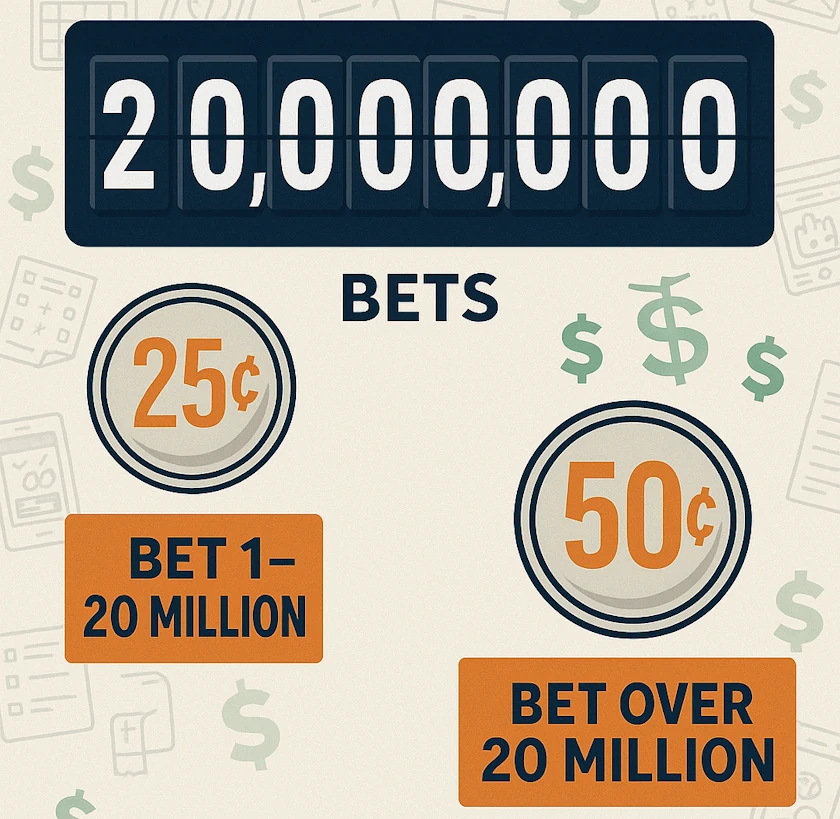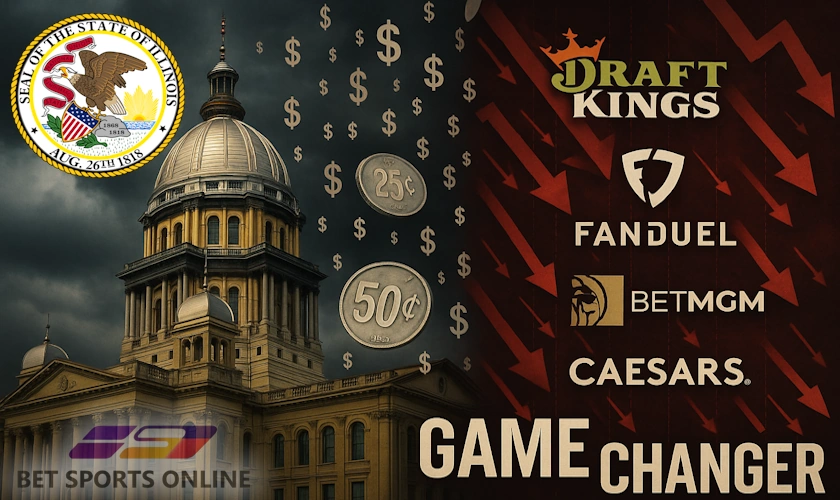Sportsbook Operators in Illinois will pay 25 cents per wager up to 20 million bets and then 50 cents per bet after that. Stock prices are already taking hits, and other states are watching closely
Sportsbooks operating in Illinois could soon face a major shake-up in their bottom line, as lawmakers introduce a new sports betting tax structure. The new Illinois Pay-Per-Bet Tax would charge operators 25 cents for every bet placed up to 20 million bets and 50 cents per bet thereafter.
Yes, you read that right. Not a percentage of profits. Not just on revenue. We’re talking a per-bet tax.
The proposal, which surfaced in Springfield as part of an effort to bolster state coffers, shifts away from the traditional sports betting tax on gross gaming revenue and instead levies a flat fee per wager. Instead, it is a Pay-Per-Bet Tax which according to legislators backing the measure, it’s designed to simplify tax collection and ensure the state benefits even when sportsbooks pull clever accounting tricks to minimize reported revenue.
How the New Illinois Pay-Per-Bet Tax Works
Under this new structure, licensed sportsbooks would pay:
- $0.25 per bet on the first 20 million bets placed annually
- $0.50 per bet on every bet beyond that threshold
To put this in perspective, the new Illinois Sports Betting Tax would:
A bookie that takes 20 million bets in a year would owe $5 million in taxes. Every additional million bets would cost them another $500,000.

Industry Reaction: Boiling Point
Unsurprisingly, the industry is not thrilled. Operators warn that this kind of per-bet taxation could crush smaller sportsbooks and lead to worse odds or fewer promotions for Illinois bettors. Even if an operator uses a sportsbook pay per head like Bwager.com to cut down on cost, it will be difficult for them to stay competitive.
“This is a sledgehammer, not a scalpel,” said one sportsbook executive who requested anonymity. “It punishes volume regardless of profitability. You could lose money on a promotion-heavy month and still owe the state millions.”
The Sports Betting Alliance, representing major players like DraftKings, FanDuel, and BetMGM, is lobbying hard to prevent the bill from moving forward. They’ve warned of reduced investment in the state, fewer job opportunities, and even a pullback from some operators if the tax becomes law.
Sports Betting Stocks Slip as Illinois Passes New Pay-Per-Bet Tax
Shortly after Illinois lawmakers gave final approval to the per-bet tax, the stock market responded—and not kindly. Shares of major sportsbook operators tumbled in afternoon trading, with:
- DraftKings (DKNG) falling over 6%
- Flutter Entertainment (PDYPY), the parent company of FanDuel, dropping 4%
- Caesars Entertainment (CZR) down by 3.5%
Analysts cite the new tax as a direct threat to operator margins. Especially for companies already spending heavily on customer acquisition via sportsbook marketing and SEO.
“This sets a dangerous precedent,” said gaming analyst Rachel Moore at Apex Markets. “If other states follow suit, sportsbooks could face serious pressure to scale back operations or raise the bar for customer incentives. That’s going to hit growth potential and investors are already pricing that in.”
What Illinois’ New Sports Betting Tax Means for the Industry
Illinois’ bold move could signal a paradigm shift in how states tax sports betting. Instead of fighting through complex profit calculations and adjusted revenue loopholes, a per-bet-tax model gives regulators a simple, enforceable system with guaranteed income.
But there’s a catch:
- Smaller operators may struggle to survive under the new tax burden, which favors high-margin giants who can absorb the costs.
- Innovation may slow down, as companies pull back on marketing and product development to offset the higher fixed costs.
- Bettors could feel the squeeze, with sportsbooks offering fewer bonuses, smaller payouts, or worse odds to maintain profitability.
- Other states might be tempted to copy this model, especially if Illinois’ tax revenue skyrockets as predicted.
Ultimately, this could be a litmus test for the entire U.S. market. If Illinois pulls in record revenue and the big players stick around, per-bet taxes could become the new standard across America. Some gambling analysts think that this might actually happen. Especially if the prediction that gambling market will reach $182.2 billion by 2030 according to the latest 2025 Gambling Industry Report by iGaming Direct.
But if operators begin to bail out of the Prairie State or pass excessive costs on to bettors, the experiment might backfire.

A Different Take on Taxing Gambling
Supporters argue that the current model, taxing a percentage of adjusted gross revenue (AGR), lets sportsbooks write off far too many expenses and promotional bets, which sharply reduces how much they actually pay the state.
“It’s time Illinois stops leaving money on the table,” said Rep. Emanuel Rodriguez, a key sponsor of the bill. “This model ensures the state sees revenue for every single wager, just like we do with other sin taxes like alcohol or cigarettes.”
And he’s not wrong. Illinois collected over $150 million in sports betting taxes last year under the current tax system. But analysts estimate that a per-bet tax could potentially double that amount, depending on the volume.
What’s Next Now After Illinois Drops a Bomb on Sportsbooks?
The bill still faces significant hurdles. It’s sparked heated debates in both legislative chambers and among stakeholders. Expect heavy lobbying, revised proposals, and potential compromises before anything becomes law.
But one thing’s for sure, Illinois isn’t done experimenting with how to cash in on the sports betting boom. And if this model gains traction, don’t be surprised to see other states watching closely.
Bottom Line:
Illinois might become the first state to tax sportsbooks by the bet, not by the buck. For bookies, no matter the profit margins, it means high volume equals high taxes. For traders? Time to keep a close eye on your gambling stocks. And for bettors? Don’t be shocked if your favorite sportsbook suddenly tightens up its sportsbook promos.

